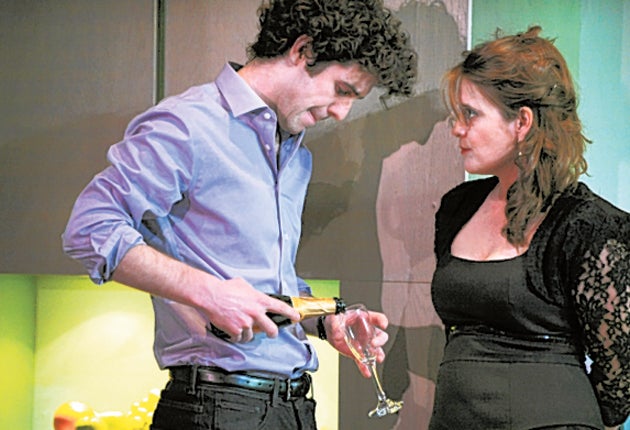Wastwater, Royal Court, London

Your support helps us to tell the story
From reproductive rights to climate change to Big Tech, The Independent is on the ground when the story is developing. Whether it's investigating the financials of Elon Musk's pro-Trump PAC or producing our latest documentary, 'The A Word', which shines a light on the American women fighting for reproductive rights, we know how important it is to parse out the facts from the messaging.
At such a critical moment in US history, we need reporters on the ground. Your donation allows us to keep sending journalists to speak to both sides of the story.
The Independent is trusted by Americans across the entire political spectrum. And unlike many other quality news outlets, we choose not to lock Americans out of our reporting and analysis with paywalls. We believe quality journalism should be available to everyone, paid for by those who can afford it.
Your support makes all the difference.The art teacher and the policewoman having an afternoon tryst in a hotel bedroom near Heathrow Airport talk about the Lake District. His sister has gone to Lancaster to visit their mother, while she remembers camping holidays on Wastwater, the deepest lake in the country, half covered in shadows, still and secretive.
Simon Stephens's new play, beautifully directed by Katie Mitchell, charts the muddy relationships of people in and around child care in a triptych of inter-linked plays that are as haunting as the distant drone of the aircraft over Heathrow, where the plays are also set. People come and go, definitely not talking of Michelangelo.
First, in an overgrown conservatory of weeds and broken glass, fussing old Frieda (Linda Bassett) says farewell to foster son, Harry (Tom Sturridge), who is jumpy about going to Canada. He killed his best friend in a car crash, he has history as a pyromaniac, and he's obsessed with the ecological disaster, he says, of farming.
Frieda says that Sian, another of her foster children, was never really happy. In the last play, in a warehouse right under the flight path, we see the upshot: Amanda Hale's bossy child-trafficking agent Sian is giving another teacher, Angus Wright's wrecked Jonathan, a tough time over the Filipino nine-year old girl he's ordered up after seven years of trying to adopt with his wife.
So, a farewell to start with, and a tentative greeting at the end. But Stephens seems to be saying nothing deep or lasting is guaranteed in these adoptions of convenience. In highlighting various problems he is inadvertently arguing for natural parenthood. Damage is going to be done on both sides of these unnatural equations.
But in the middle play, the strongest panel in the triptych, Stephens touches on the sensitive area of how irreproachable should anyone be in order to oversee children. For most of us, this is a no-brainer. Joe McInnes's sex bomb lady copper is a former heroin addict and part-time porn star, and she's in child protection.
There's nothing to indicate how good or bad she is at her job, but Stephens may be suggesting we're all entitled to some privacy with dark spots. Lisa wants Mark to have blindfolded sex and to hit her hard. He's so shocked that he does so, viciously, across the face. She reveals that she doesn't have sex with her partner.
Mark, carefully and humorously played by Paul Ready, is on his way to Minneapolis on a Fulbright scholarship, and turns out to be the car accident boy's teacher; he was his star pupil. Both teachers have been damaged, or at least deeply affected, by doing their jobs.
Sian asks Jonathan why anyone would want to raise a child in this world. It's a good question if you don't mind signing up to pessimism. All of Stephens's characters are fretting at the end of some emotional tether, and the plays keep you interested.
A palpable poetic tension runs through Mitchell's discreetly thought-provoking production, with planes rumbling away, and a policewoman only capable of prosecuting her affair by turning up the pop music and unexpectedly quoting Charles Dickens in Great Expectations: "Heaven knows we need never be ashamed of our tears, for they are rain upon the blinding dust of earth, overlying our hard hearts."
To 7 May (020 7565 5000)
Join our commenting forum
Join thought-provoking conversations, follow other Independent readers and see their replies
Comments